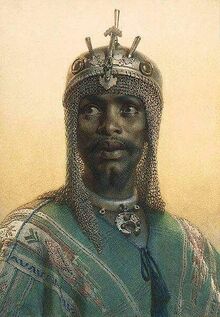Guilherme I of Coventrey
| Guilherme I | |||||
|---|---|---|---|---|---|
 | |||||
| King of Coventrey (more...) | |||||
| Reign | 10 November 1237 - 22 April 1275 | ||||
| Acclamation | 13 November 1237 | ||||
| Predecessor | Afonso I | ||||
| Successor | Joaquim I | ||||
| Born | 15 October 1219 TBA | ||||
| Died | 22 April 1275 (aged 55) Palace of Santo Domingo, Coventrey | ||||
| Burial | Cathedral of Santo Domingo, Coventrey | ||||
| Spouse | TBA | ||||
| Issue | |||||
| |||||
| House | Stewart | ||||
| Father | Afonso I | ||||
| Mother | TBA | ||||
| Religion | Coventrian Catholic | ||||
Guilherme I of Coventrey nicknamed the the builder (15 October 1219 - 22 April 1275 succeeded his father Afonso I as the 2nd King of Coventrey in 1237 reigning until his death in 1275. He was the third son of Afonso I, but the eldest surviving son, his two older brothers having predeceased their father, leaving Guilherme as sole heir to the Coventrian throne.
Reign
With his father's death in 1237, Guilherme became the second king of Coventrey ruling for thirty eight prosperous years. As King Guilherme had an all together different approach to ruling then his father choosing to devote his time to administration as opposed to military affairs; devoting much time on the administration of the new kingdom, the support of a growing merchant class, and the building of new towns an settlements earning him the nickname the builder.
To secure recognition of Coventrian independence Guilherme sent ambassadors offering elaborate gifts to several kingdoms throughout the world, establishing trading relations with most of them.
During his lifetime, Guilherme I was known for his love of knowledge and the learned arts, writing several treaties on administration and royal governance. Early in his reign because Coventrey lacked any institutions of higher learning he sent the most enlightened students abroad for further education paying for their studies from the royal treasury.
It was not until 1247, that Guilherme established the University of Saint-Domingue in 1247, the first institution of higher learning in the medieval kingdom of Coventrey
He died in Santo Domingo in 1275.